
Cross Country Tour
September 23, 2008
By Jane Ayer
Our annual peek inside bakeries from coast to coast.
| Nova Scotia Returning to Scratch |
New Brunswick A Series of Unusual events |
| Ontario The Making of Fred's Breads
|
Alberta Spreading a Love for Good Bread |
| British Columbia Innovative Baking on the West Coast |
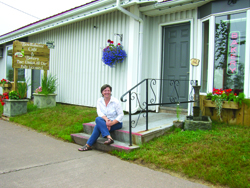 Nova Scotia: Returning to Scratch
Nova Scotia: Returning to Scratch
Originally from Nova Scotia, Liz Garnhum moved to California years ago when she was presented with a business opportunity she couldn’t refuse. She says she loved it there: the climate (warm and sunny), the work (both managing and running restaurant or foodservice operations). But eventually, the time came to return home. She did that in 2007, with thoughts of buying her own business forefront in her mind. Garnhum scoured the province, looking for the right fit. When she drove into Parrsboro, a small town on Nova Scotia’s Minas Basin in Northern Nova Scotia that claims some of the highest tides in the world, Garnhum fell in love, both with the town and the business she was there to visit.
“I pulled into town and I never left.”
She bought Carole’s Bakery, a small business that had been on the go for decades at the end of Main Street. The building also housed a Greco Pizza outlet and Captain Submarine franchise. Once both of those businesses moved out, Garnhum’s work began. She says the building was barebones and “stark white.” Fresh paint and well-selected decorations brought a more welcoming, seaside flavour to the business, as did a name change: Bouillabaisse Café & Bakery, with the café on one side of the building and the bakery on the other.
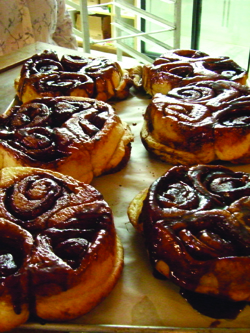 While the bakery was well established in the town, Garnhum wasn’t completely thrilled with a lot of the products it was making and selling. Most of them came from mixes, and Garnhum says they just didn’t have the flavour profile she wanted.
While the bakery was well established in the town, Garnhum wasn’t completely thrilled with a lot of the products it was making and selling. Most of them came from mixes, and Garnhum says they just didn’t have the flavour profile she wanted.
“They were very economical to make, but they didn’t have that homey taste I was looking for,” she says. “I’m all about the flavour and naturalness of food.”
And so the switch-up: Garnhum encouraged the two bakers, Helen and Heather, to find new recipes for some of the baked goods they’d been making for so long. And slowly, bit by bit, new, from-scratch breads and cookies and pies replaced the from-mix products its customers were used to. They were a hit, both with Garnhum, who sampled and gave the stamp of approval to each of the new products, and with the customers, most of whom are locals. The bakery’s scratch donuts are consistent best-sellers (I tried them hot from the deepfryer when I was there, and can absolutely understand why), the fresh pies (coconut cream with “mile-high cream,” lemon meringue, seasonal berry pies) are also a hit (Garnhum says, “I could fix the world if I could give everyone a slice of our pie and coffee”), and the bakery’s gooey, oozing sticky buns have earned themselves a reputation throughout the province, complete with accolades on one of the CBC radio programs which airs out of Halifax.
The bakery also offers wedding cakes, does catering, and has become known for its willingness to take special requests. One customer called to see about ordering a cranberry pie, something they’d had as a child and had never seen at a bakery since then. Garnhum says the bakers set to work, and created something that was exactly what the customer was looking for.
“I had to try some myself,” says Garnhum. “It was quite nice tasting.”
Bouillabaisse has done some advertising to get the word out, placing flyers at local tourist bureaus, along with newspaper ads in local papers in the county, but mostly, it relies on word of mouth to spread news of both the bakery and the café. Garnhum has also become quite involved in the community in the short time she’s lived in the area. She’s a member of the Parrsboro Board of Trade, and made certain Bouillabaisse takes part in any local parades and events. For the town’s annual Christmas parade, Garnhum even sourced a gingerbread costume from the U.S. that she wore herself, handing out cookies and treats to the towns kids. The gingerbread man also makes an appearance at kids’ parties held at the bakery, where he acts as host of the party and helps lead cookie-making and cake-decorating sessions.
Garnhum has worked hard to make herself and her business a big part of the community. But that doesn’t mean the bakery was immune when commodity prices shot through the roof, not long after she took over. Garnhum says she struggled with how to deal with the issue.
“We did do a few small price increases, but my philosophy is to kill with volume, not prices,” she says. “When things got really tight, we expanded, starting up a wholesale business with the local grocery store. That really helped and will pull us through.”
Expanding the bakery’s commercial business even more is something Garnhum very much has on her mind, though likely not for another year or two. Along with that, Garnhum would love to expand the premises, perhaps including a warehouse for storage and some of the baking and cooking. Already the owner of a cube van, delivery wouldn’t be the issue, says Garnhum: cooking and baking space is the biggest premium right now, and more of that could mean more business for café and bakery.
But in the meantime, Garnhum says she’s happy with how things are going and is grateful to call both the bakery/café and the town of Parrsboro home.
“I love rural Nova Scotia,” she says. “I’ve only left to go into the city and then I can’t wait to get back. I love it here.”
New Brunswick: A Series of Unusual events
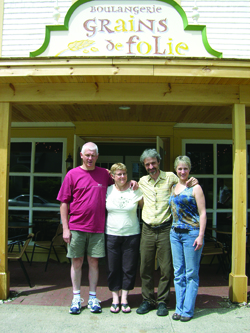 |
| Above: French bakers Didier and Isabelle Goulier (on the left), arrived to work in Boulangerie Grains de Folie in northern New Brunswick in February. The bakery is owned by Claude Bergeron and Lorraine Haché (right). |
If you follow the New
Brunswick coastline north, you’ll eventually hit the Acadian Peninsula.
Keep driving, another hour or so, through pristine, well-kept Acadian
towns and villages and you’ll come to the town of Caraquet, at the
northeastern tip of New Brunswick on the Chaleur Bay. Known as the
capital of Acadia, Caraquet was established in the 1750s by Acadian
settlers who were victims of the British deportation in the south.
Although it has its roots in Acadia, Caraquet is a Micmac term which
means, “the meeting of two rivers.”
It’s there that you’ll stumble upon the newly opened Boulangerie Grains
de Folie, housed in a massive century building that it shares with a
yoga studio, a tiny, but well-stocked bookstore and an épicerie fine
(fine grocery store) featuring both local and imported products. With
its wooden trim, screen doors and colourful window boxes, the bakery
looks right at home in the century-old building, exactly what owners
Lorraine Haché and Claude Bergeron worked long and hard to do.
After growing up in the area, and moving away to live and work for some
years in the southeastern New Brunswick city of Moncton, the pair made
the decision to return to Caraquet. Both had extensive experience in
the human resources field, and Haché had also taught at the University
of Moncton (where she continues to work, now at the university’s campus
in Caraquet). When they returned to the Acadian Peninsula, Haché says
they missed one thing: good, crusty, European-style bread.
“Every time we travelled, we were drawn to small bakeries and cafés,”
she says. “When we lived in Moncton, we were used to buying bread from
the market there and when we moved back here it was difficult to return
to regular grocery store bread.”
And so, without any kind of baking or café experience under their belts
whatsoever, the two mused about setting up a bakery, a European-style
one that could supply them with the kind of bread they’d become
accustomed to. They bought the century-old building, with thoughts of a
bakery and also a yoga studio (one of Haché’s many hats is also that of
yoga instructor), which required much updating and retrofitting, but
Haché and Bergeron loved its historical aspects and insisted on keeping
many of its original features, including a beautiful tin ceiling. After
being told a firewall was required in the ceiling for insurance
purposes, the contractor the pair hired carefully pried off each tin
tile, numbering every one of them to be able to put them back in
exactly the right place. They also brought in local set designer Luc
Rondeau to create just the right atmosphere for the bakery.
“What we wanted was a warm, homey style where people wouldn’t feel
rushed,” Haché explains. “We definitely didn’t want a fast-food type of
place.”
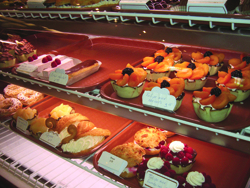 Gleaming
Gleaming
wooden floors, wooden tables like you might find in a family’s kitchen
(including mismatched wooden chairs), wooden railings and wooden beams
all complete the warm, comfortable feeling Haché and Bergeron were
looking to create.
Next on the agenda? The big task of actually finding bakers to fill
the bakery’s display cases with breads and pastries and croissants.
When Haché’s son expressed an interest in learning how to bake bread,
he went to a Quebec college to seek training. It was around the same
time Haché and Bergeron received a call from town officials. And this
is when Caraquet, besides being the “meeting of two rivers,” also
became a meeting of two worlds.
Let’s travel, for a moment, to Rouen, France, where husband and wife
team Isabelle and Didier Goulier were running their own bakery. Didier,
with 30 years’ experience as a baker and pastry chef, happened to hear
a news story on the local radio station that government officials from
Canada were in the area, giving presentations on immigrating to Canada.
They were specifically looking for bakers. His curiosity piqued, Didier
made some phone calls, finally speaking with immigration authories in
Fredericton. They put him in touch with a bakery owner from Moncton who
had been on the recent trade mission to France (along with town
officials from both Moncton and Caraquet) and who was looking for a
baker, but someone with a little less experience than Didier (and who
might not expect the same sort of compensation). Moncton town officials
then contacted Caraquet officals, explaining the situation. Haché and
Bergeron just happened to be working on getting all of the required
permits at the time, and when they heard a baker from France was
interested in finding work in New Brunswick, they jumped at the
opportunity. The Gouliers came to visit Caraquet in the fall of 2007,
and, with their sense of adventure sparked, agreed to come back in
February, this time for good.
“We wanted a change of horizon,” says Didier.
Besides the new horizon, the pair have also had to become used to other
changes, from the pace of work (“The rhythm of work was much slower,”
says Didier. “There’s a very nice quality of life here.”), to the
Acadian accent (very different from French accent), to the ingredients
(common Canadian ingredients like blueberries and cranberries are not
so common overseas), to the grocery stores.
For the first little while (until Haché’s son finished his training in
Quebec), Didier and Lorraine made all of the products for the bakery,
including breads, pastries and vienoisseries. Although many of the
formulas required some adjusting (mostly because of the difference in
flour strength), Didier says the transition was smooth for the most
part, and the bakery opened full time on Feb. 21 of this year.
Overall, the pair has settled in well to the community. Their son just
recently arrived for a visit and they now own a car and a home in the
area. I ask them how long they think they’ll stay.
“We just arrived,” Didier says with a smile, “give us some time.”
The bakery’s name, “Grains de Folie,” means a streak of madness,
exactly what seems to have transpired in this small northern New
Brunswick town, with a series of events Bergeron and Haché could never
have foreseen when they first set the wheels in motion to open a
bakery. But it worked. And the pair has high hopes for the future.
Ontario: The Making of Fred's Breads
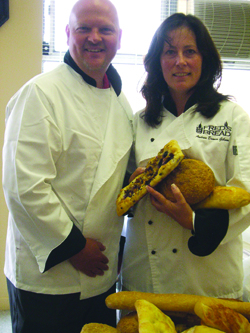 |
| Steve Gibson and Andrea Damon Gibson are the husband and wife team behind Toronto’s Fred’s Bread. |
There’s a certain
alchemy, a magic that happens when flour and water are mixed together
and allowed to ferment and grow from the yeast living in the air around
it. It was that magic that first captivated Andrea Damon Gibson back in
1991 while working as a pastry chef at Toronto fine dining institute
Splendido. Damon Gibson, fresh from what she describes as a “pilgrimage
from San Francisco to L.A.” to visit such bakery legends as The ACME
Bread Co. and La Brea Bakery, was inspired to try her own hand at
making “good” bread.
“I wanted to make good bread and ACME was sort of the benchmark,” says Damon Gibson.
She started testing out various formulas and, after much experimenting,
found something that worked and that Splendido’s customers enjoyed. A
few years later, seeing a need to be filled at other restaurants in the
city, and having always wanted to run her own business, Damon Gibson
decided to strike out on her own. After mixing her first sourdough
starter in her apartment at the end of 1994 and getting help from
husband Steve Gibson (an MBA graduate working for Black & Decker at
the time) on a business plan to take to the bank, so was born Fred’s
Bread. Having read about James MacGuire’s legendary Le Passe-Partout
restaurant in Montreal and the bread he was making there, Damon Gibson
got in touch with MacGuire and soon enough found herself on her way to
Montreal to complete a one-week stage at MacGuire’s in-house bakery.
“It was great,” remembers Damon Gibson. “I spent the nights with his
baker and it was a really terrific experience. Eighteen years ago,
sourdough was described as some mystical experience and there was no
one here to teach you about it. (James) sorted out some misconceptions
that I had about the process.”
Misconception #1: That starters had to be extremely sour and taste like
vinegar. The breads MacGuire made were flavourful and nutty, but not
extremely acidic.
Misconception #2: That starters would only grow with spring water and organic flour. Not necessary, suggested MacGuire.
Misconception #3: That instead of measuring and moderating the precise
temperature for everything (the water, the air temperature, the starter
itself), one should just go with feel and touch. Temperature,
emphasized MacGuire, was key.
Damon Gibson returned to Toronto re-inspired, setting up shop in a tiny
unit just north of the 401 in the city’s west end. The business
consisted of Damon Gibson as the baker and salesperson, an office
manager and a part-time driver. Damon Gibson would make dough in the
afternoon, bake the bread overnight, catch a nap on a futon couch in
the office sometime during the day, and, in between, make sales calls.
Scaramouche (another long-established Toronto eatery) and high-end
grocery store Pusateri’s were among the bakery’s first customers (Damon
Gibson is proud of the fact both are still customers). Damon Gibson’s
father, Paul, came on board to help out where needed, mostly with
accounts payable, and husband Steve left Black & Decker in 1998 to
join Fred’s Bread full time.
“He’d always helped out with business and we decided the time was right to do it together,” says Damon Gibson.
Together, the pair decided Fred’s Bread would never venture into the
retail business of selling bread, says Damon Gibson. Fred’s Bread would
always be wholesale.
“The focus was always going to be the restaurants,” says Damon Gibson.
“The idea was never to run the retail side of things ourselves, it’s
too expensive.”
The bakery’s customers are still 60 to 70 per cent restaurants, with
grocery stores and other high-end food stores making up the rest of the
business, something that helps protect the bakery’s margins when the
economy tightens up. A recent move to offer customers frozen dough
products has also allowed the business to expand both its product line
and its customer base, to those outside the immediate GTA. Damon Gibson
says demand for Fred’s Bread breads has also grown because of in-store
sampling at the retail level and participation in such shows as the
CRFA Show in Toronto this past March.
All that growth requires more space for baking and doing business.
Fred’s Bread has already expanded into the unit beside it, giving it
4,200 square feet to squeeze in everything from the sales office to the
newly installed Miwe deck oven (“our Caribbean condo,” jokes Damon
Gibson). With double-digit growth in the past year alone, the bakery
will expand into another unit this fall, upping its space to 6,400
square feet.
Fred’s Bread currently employs 30 staff members altogether, eight of
whom are bakers. Because of the never-ending difficulty in finding
skilled bakers, Damon Gibson trains the bakers herself. Most of the
work is still done by hand, although a molder, hydraulic divider and
that new Miwe oven (complete with an automatic loader) have made the
process a little more efficient.
The bakery makes 25 varieties of bread every day, although it has 45 to
50 varieties on its product list, with over 200 SKUs. Damon Gibson
admits having a hard time paring down that list: part of it is a
connection to the products she’s developed, but part of it is also the
fact customers have come to expect variety from Fred’s Bread.
“We’ve developed a reputation for offering a huge variety of interesting products,” says Damon Gibson.
Many of those products evolved out of customer requests (the yeasted
products like a French baguette, an organic French baguette, and a pain
rustique, many of them out of Damon Gibson’s interest in local,
seasonal and organic products. Some of the seasonal products have
included a concord grape pizza (see the formula in this year’s annual
recipe collection, Flavours of Canada), an asparagus flatbread and a
pizza terra, covered with local new potatoes, sweet potatoes, beets,
toasted sage and caramelized onions.
Damon Gibson says Fred’s Bread will continue to offer its customers the
quality, high-end products it’s become known for. But that doesn’t mean
she wouldn’t make a few changes. First on the list would be expanding
into a separate, production facility, one with lots of room for more
growth. Fred’s Bread is also in discussion with a distributor in the
U.S. And Damon Gibson has also played with the idea of a little retail
spot attached to the business, along with expanding into take and bake
products. The opportunities, Damon Gibson says, are endless, despite
increased competition from other high-end bread makers.
“There are more people in the upper end of the market, but I think it’s
a good thing. It means the market has grown. There’s more competition
but it keeps us on our toes.”
The market may have changed and grown, and Fred’s Bread along with it,
but one thing hasn’t at the bakery: the sourdoughs still take about 20
hours from start to finish.
That alchemy is still allowed to work its magic.
Alberta: Spreading a Love for Good Bread
"Close your eyes. Bite into a slice of Tree Stone bread.
Taste the beauty of a blue Alberta sky,
The natural goodness of a shining wheat field
And savour the pleasure Tree Stone offers."
Statement from Tree Stone Bakery brochure
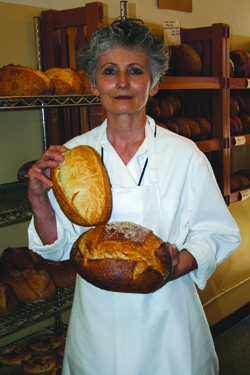 |
| Nancy Rubuliak is the owner, operator and baker of Tree Stone Bakery in Edmonton.
|
Tree Stone Bakery recently celebrated its 10th anniversary. But the
roots of the Edmonton artisan bread bakery run deeper than that. Its
origins trace back to the mid-’80s, when Tree Stone owner Nancy
Rubuliak spent a year travelling and soaking up the sights, sounds and,
most importantly, the tastes of Europe. What really impressed her was not only that different countries offered varied
bakery products, but also that regions and towns and even individual
bakeries produced baked goods, and particularly breads, with signature
tastes and characteristics. In many respects, they amounted to the very
opposite of franchise operations characterized by predictability,
consistency and uniformity.
“In Europe I learned a lot about food by paying attention. It left me
wanting to learn more about breads. I believed I could do it – I
realized that making good bread is not rocket science,” explains the
Tree Stone proprietor sitting down for a breather after closing up her
shop on 99th Street, a busy thoroughfare a few blocks north of Whyte
Avenue in Edmonton’s trendy Old Strathcona district.
While the European experience had planted the idea of someday starting
her own bakery and making the French sourdough breads that now form
Rubuliak’s stock-in-trade, the concept took some time to leaven. She
returned Canada to work within her then chosen field as a registered
social worker.
Baking bread may not be rocket science, but Rubuliak figured some
expert advice would be useful. So, in 1997, she enrolled in a course
given by bread guru Didier Rosada at the National Baking Center in
Minneapolis. That was followed by a three-month renovation project to
convert and rewire what had been a street-level print shop to house a
two-deck, six-pan oven and other bakery equipment. (That has been
followed by two expansions into adjacent premises to accommodate a
small café and a four-deck Miwe oven with a loader.)
While she approached the venture in a businesslike way – complete with
a business plan and the intent of earning a living – Rubuliak admits
she was heading out on a wider adventure. Like braided bread, the
business goals had several strands. A central mission was making good,
nourishing bread that people really would enjoy eating.
On yet another level, Rubuliak concedes, “I really wanted to do something that would serve the planet.”
At one time, she considered making that connection with the earth
through farming but ultimately decided that she could achieve a similar
link by caringly shaping products from what the land offered.
That earthly connection even came into play in choosing Tree Stone as
the business title. Rubuliak sees the name as symbolizing life
represented by a tree and by the earth on which that life rests.
That down-to-earth approach is evident throughout Tree Stone Bakery’s
operation. For instance, wheat and rye used in whole-grain products are
grown by two Edmonton-area organic producers and then are ground
in-house at Tree Stone. White flour comes from organically certified
mills in Lethbridge, and Camrose, southeast of Edmonton. While Rubuliak
didn’t set out to meet such targets – and in fact began her business
before the concept gained much of its current popularity – many of her
ingredients satisfy the criteria of the 100-mile diet.
Ongoing and strong links with suppliers help ensure the quality of Tree
Stone inputs and reflect the kind of relationship-building Rubuliak
also extends to customers.
At one time, she may have envisioned setting up a “neighbourhood bread
shop.” In fact, her base of customers – many of whom have European
backgrounds and a strong appreciation for good bread – extends far
beyond the immediate Strathcona area. Some regular customers definitely
break the 100-mile-diet rule by travelling from as far away as Calgary.
Mostly, the reputation of bread that pleases the pallet has been spread
by word of mouth.
“The only way to make it was to specialize and to make it better –
Grade A,” Rubuliak insists. “Our prices are definitely higher than in
supermarkets – we bake for people who really care about bread.”
What customers find is an intentionally fairly restricted selection of
about a dozen types of hand-formed breads – including white, whole
wheat, multigrain, baguettes, country rye and maslin. No additives or
preservatives are used and most of the breads are proofed using wild
yeast (pain au levain) cultures. Visitors to the Tree Stone can enjoy a
coffee and some brioche – one of the few concessions for those with a
sweet tooth – in the adjacent café.
“We are definitely not a full-line operation,” Rubuliak observes. There
are other ways in which Tree Stone differs from other bakeries, which
thanks to an overnight shift may have fully stocked shelves first thing
in the morning. Nancy Rubuliak typically begins work at 5 a.m. and
usually continues baking until the early afternoon.
Reliance on the slower sourdough techniques, rather than faster-rising
baker’s yeast, also tends to stretch out production. The result can be
that customers think the store is sold out, only to be encouraged,
“Please come back in an hour, we’ll have something then.”
For Rubuliak, this somewhat flexible production schedule partly stems
from self-preservation. She plays a central role in running the store –
including not only baking but also serving the goods. Even with a five
o’clock start, it’s not unusual for Rubuliak’s day to run till 6 p.m.
Along with many other Alberta business operators, Rubuliak shares the
challenge of finding and retaining good staff. That’s particularly true
when it comes to hiring experienced bakers but also extends to sales
personnel. Shortages have become all the more acute in recent years
amid the province’s bubbling-hot energy boom.
For seven years, Rubuliak was fortunate to retain the services of a
young woman she herself trained in the craft. Following that employee’s
departure last December, Rubuliak has tried without success to hire
suitable journeymen bakers. Generally they have the sort of commercial
experience that doesn’t fit well in a very hands-on artisan operation.
For Rubuliak, difficulty in hiring the right people has meant, “I can’t produce enough to meet demand.”
Recently, she took on a new apprentice with a view to again sharing her
knowledge, as well as her love and commitment to making good bread.
That passion has not gone stale after a decade of running Tree Stone.
“I have worked to make the best bread possible. It’s been a great
experience and it has given me a lot personal satisfaction – it’s
really a life-giving work.”
British Columbia: Innovative Baking on the West Coast
by Tuija Seipell
 |
| All in the family: the key players of the Bread ’N’ Buns Factory include, from left to right: Yvonne Park (wife to Jae); Irmgard Schelesny, the store’s longtime manager; Doo Yun and Linda Park (holding grandkids) and Jae Park.
|
What Jae Park did with the $11,000 he won at this year’s California
Walnut Inspiration Contest at the CRFA Show in March, pretty much
summarizes what you need to know about the man and the company he
operates with his family.
Representing his family firm, Bread ’N’ Buns Factory of Coquitlam,
B.C., Jae won both the Best in Show (with a prize of $10,000) and the
Breads category (with a prize of $1000) for his California Walnut
Raisin Rye Bread. (See details of the contest by going to
www.bakersjournal.com and clicking on Web Features).
“We had a big company dinner at a nice restaurant with all of our
employees,” Jae says. “We also had a bowling and pizza night where
every participant received $50 and the first prize winner received
$300, second $200 and third $100. We also bought some new uniforms. So,
most of the winnings went back into our company through our employees.”
Hard work and mutual respect permeate everything at this bakery
business, established by Jae’s father, Doo Yun Park more than 20 years
ago. When Jae accepted his prize in Toronto he said, “I’m proud to
represent my family and accept this honour on their behalf. I learned
everything I know about baking bread from my father and am excited to
be recognized for our winning product.”
Bread ’N’ Buns operates a 4,000-square-foot retail bakery and deli (of
which 2,200 square feet are retail and the rest is bakery and support
area) in a strip mall in a residential area of Coquitlam, about 45
minutes’ drive from Vancouver. The commissary where the par-baking
takes place is in an industrial area close to the store. Currently,
about 40 per cent of the revenue comes from wholesale – distribution by
Snowcap to grocery stores and hotels – but the main business is retail.
Dream team
The key players leading the 30-person staff team are Doo Yun Park and
Jae Park, who run the “back” of the business, and Linda Park (Jae’s
mother), Yvonne Park (Jae’s wife) and longtime store manager Irmgard
Schelesny, who run the “front.”
“We are really a dream team because everyone is doing what they love to do,” says Doo Yun Park with obvious pride and pleasure.
Jae became a full-time employee in 2002, after graduating from Simon
Fraser University with a business degree. He explains the division of
responsibility between father and son.
“My father is a seasoned businessman but he gives me as much
responsibility as I can handle. He lets me experience things on my own
even if it means that it’ll take longer or I’ll make mistakes.”
Variety brings customers
“We are known for our bread and buns,” says Irmgard. “We make our bread
without sugar or preservatives. It is real bread that does get stale
after a few days. Our customers love the quality and taste.”
The company makes about 30 varieties of bread and 18 kinds of buns,
with the light rye bread being the best-seller. The cake selection is
currently expanding. Children’s birthday cakes are really successful,
says Irmgard, showing off the fresh cakes decorated with SpongeBob
SquarePants, Nemo, Winnie the Pooh and various princesses.
The store also has a large deli section with cold cuts, cheeses and
other deli items. In addition, there is a selection of European
groceries – pickles, dry breads, crackers, jams and so on – and even
some European hand-painted serving plates, bowls and pitchers, all of
which Irmgard selects personally.
For the customers, this variety has made Bread ’N’ Buns a “community
centre,” a place where you go for your daily bread, your lunch
sandwiches and picnic baskets, where you get your hostess gifts and all
of your party goods, from deli trays to specialty cakes. It is a
distinctly European concept, a place where everyone knows and meets
everyone, and where life’s joys and sorrows are shared.
“We now serve some third-generation customers,” says Irmgard.
So, when Jae started the process of rebranding the company, creating a
new name, Inno, and a new logo, the regulars got nervous. The
ever-responsive team came up with a compromise – for now, the front of
the awning says Inno, but the sides still say Bread ’N’ Buns.
Expansion plans
The Parks are developing the Inno concept in preparation for opening
additional stores. The Inno concept will be close to the existing store
concept, and the plan is to open the first new store later this year.
When Jae entered the business full time, many things started to move
ahead at an accelerated pace. One of those was the move to a separate
commissary and to the use of frozen dough. “There was a lot of stigma
in the past about that, but centralizing the mixing and manufacturing
in one location actually improves our quality control compared to
making everything fresh every day at the back of the store,” says Jae.
“We can control the environment at the factory and we can train
specialized staff. We have given them the specialized tools they need
at the factory and at the store level, we still do retarding proofing
which increases flavour and texture and we have stack ovens for the
artisan-style breads and two rack ovens with steam, so we have not
lowered the quality. In fact, we now feel more comfortable about
opening another store because we have control over quality.”
Ralf Tschenscher, Western division manager for Lesaffre Yeast Corporation, knows the Park family and their business well.
“To keep their quality consistent, Mr. Park and Jae knew they needed to
have loyal and committed employees,” he says. “They streamlined their
production by moving into a commissary. This move has allowed the
bakers to start production at 7 a.m., which is unheard of in the bakery
business. Their employees are very happy about this, and they are still
able to provide fresh baked bread and buns by 9 a.m. when the store
opens.”
Jae Park explains further: “My father and I believe in making work easy
for everyone. The bakery business is a difficult place to work in, as
are many food industry businesses. We feel that in our system everyone
is doing a job in which they can specialize. Everyone is doing a job
that they are good at to the maximum potential of their skill.”
With streamlined production, a growing product line, a new store in the
works and a product that’s singled out as one of the best in the
country, it would appear that Inno is a winning concept in the making.
See this year’s annual recipe collection for Jae’s winning California
Walnut Raisin Rye Bread formula. For more information on the California
Walnut Inspiration Contest, go to www.bakersjournal.com and click on Web Features.
Print this page
Leave a Reply